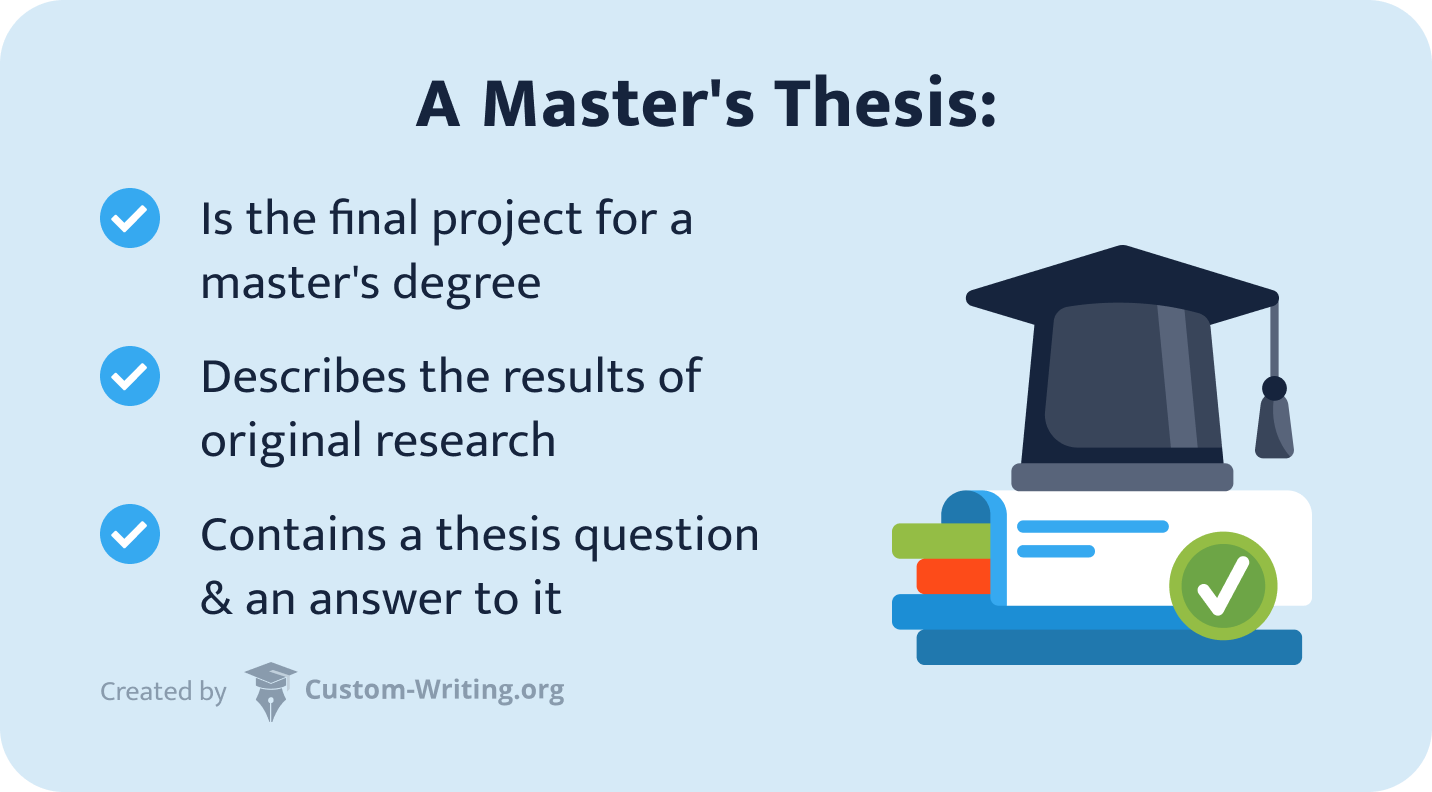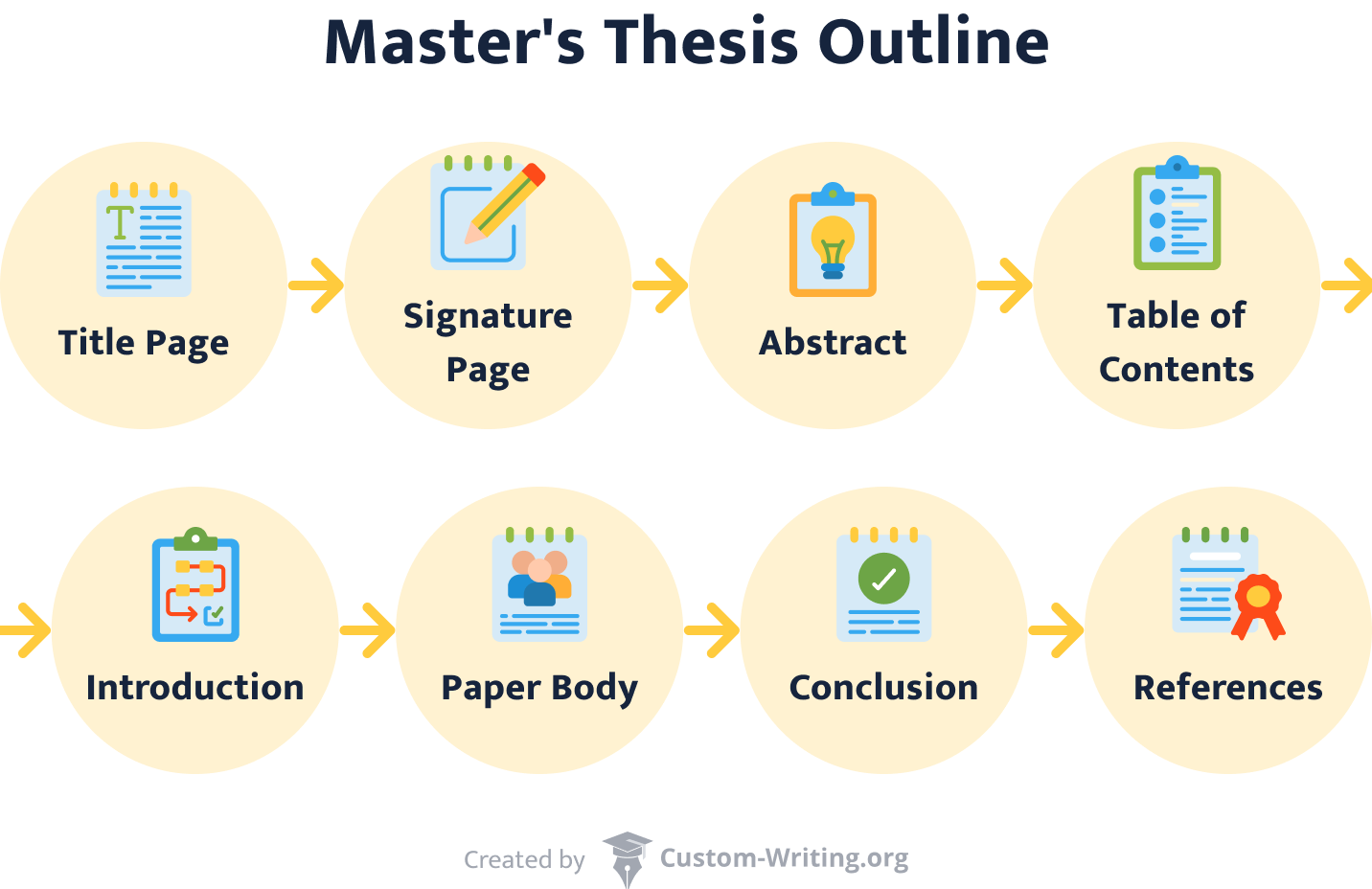It’s longer than your Bachelor’s thesis. It’s more stressful. It’s more important. And you have no clue how to write it. We understand that a lot comes with the responsibility of creating a Master’s thesis from scratch. But no need to stress out; you can get all the help you need here!
Here is a complete guide on one of the most important pieces of paper in your life (or not…). It includes detailed instructions about every step of the writing process so that you don’t miss anything! Just think about it, you only need to spend ten minutes reading this article by Custom-Writing.org experts, and it can save you hundreds of precious brain nerves.
In addition to this comprehensive guide, you might want to address our custom thesis writing service for support. Our team of professionals can help you with research, analysis, writing, formatting, or all of the above! Let us know if you don’t fully understand anything from this article or need extra information on your thesis methodology, outline, or something else.
🔤 Master’s Thesis: General Information
What Is a Master’s Thesis?
A Master’s thesis is the last paper you need to submit before you get your degree. In order to pass, it needs to demonstrate your skills in a specific field.

You should include all the results of your original research in your Master’s thesis. The main focus of the thesis goes to the thesis question and the answer.
How Long Is a Master’s Thesis?
The requirements usually vary from university to university. Moreover, it depends on the topic and methodology you chose. However, on average, a Master’s thesis should be around 50-90 pages. If you have any doubts, check the requirements you received or ask your supervisor to help. In any case, it’s a massive task, so don’t wait until the deadline!
Do All Master’s Programs Require a Thesis?
Some practical Master’s programs, such as those that require more application, don’t necessarily need a thesis. However, you might still receive a chance to choose whether to write it or not. Instead of the thesis, you can be asked to participate in an internship or do some project. Usually, at least one kind of work is mandatory.
🤯 Starting Your Master’s Thesis
Here are four useful tips on thesis writing that will prepare you for the process.
Master’s Thesis Title: Bad & Better Examples
Bad Examples
Better Example
Master’s Thesis Topics
- Explore the connection between the globalization of markets and financial stability.
- Describe and analyze the most widespread Ponzi schemes and the ways to prevent them.
- Study the problem of climate change in environmentally vulnerable countries and how to mitigate it.
- Write a master’s thesis on the use of grid technology for the development of an electronic supply chain.
- Analyze the different situational theories of leadership and their application in healthcare settings.
- Explore the impact of personal income tax increase on personal savings and work effort.
- Examine the impact of a diversified investment portfolio on profitability.
- Write a master’s thesis on investment in the oil and gas sector.
- Study the effectiveness of policies that address childhood obesity.
- Compare the effect of psychotherapy and pharmacotherapy in treating patients with mild depression.
- Master’s thesis on the nature of international credit and its role in modern economies.
- Write a comparative study of the Eurozone and Switzerland banking systems structure and differences.
- Analyze the efficacy of contemporary international organizations’ cooperation in resolving global environmental crises.
- Compare the benefits and threats of deforestation to the global ecosystem.
- Examine the traffic situation and safety concerns in Saudi Arabia.
- Examine whether a global economy is a basis for business expansion or a possible global crisis.
- Write a master’s thesis on the impact of organizational policies on decision-making.
- Explore the influence of corporate mergers and acquisitions on the effectiveness of employees’ performance.
- Analyze the driving force for changes in special education.
- Discuss the efficacy of Mobile-Assisted Learning for studying English as a second language.
- Study how climate change affects the blue crab population and what can be done to mitigate the harm.
- Master’s thesis on the specifics and problems of disaster management in nonprofit organizations.
- Examine how the level of emotional intelligence influences the leadership style.
- Write a master’s thesis on the connection between asthma and smoking among immigrants.
- Describe the impact of learners’ isolation in distance education on students’ performance.
- Explore how teachers and principals can deal with bullying at school effectively.
- Analyze the use of further virtual technology development for the medical field.
- Master’s thesis on the socialization of people with disabilities in the workplace.
- Study the effect of technology use in nursing practice on patients’ care quality.
- Examine whether reading interventions are necessary for children’s cognitive development.
- Evaluate the benefits and problems of wind energy projects.
- Write a master’s thesis on the positive and negative impact of mass media-raised issues on society.
- Explore how different forms of art describe the theme of religion in society.
- Study the effects of bilingualism on cognitive development.
- Examine the issues of real estate fund management.
- Analyze the changes in the labor market due to digital technology development.
- Study the concept of empowerment according to interpersonal theory and its role in healthcare practices.
- Research the benefits and threats of furniture business investment in the United States.
- Examine how the use of artificial intelligence changed modern economics.
- Describe the role of environmental and cultural circumstances on the linguistic development of children.
- Research and compare the EU and the US tax treaty networks.
- Explore the housing policies in California and their impact on the homelessness problem.
- Analyze the role of computers in primary school education.
- Evaluate the factors that influence actual and potential economic growth and its threats to the environment.
- Examine the role of digital Earth services and tools in studying the global warming issue.
- Write a master’s thesis on the connection between the choice of rhetorical tools in American literature and American social issues.
- Study how the pragmatic theory of truth is represented in different religions.
- Analyze the role of cultural diversity issues in therapists’ practice.
- Study the tax effects on stock price behavior around dividend dates.
- Examine the scope of unequal opportunity of urban youth issue and its impact on the American unemployment crisis.
📑 Outlining a Master’s Thesis
Let’s go through the process of creating an outline for your Master’s thesis step by step.

🤓 Organizing the Writing Process
- Schedule your writing process. Do that on a week-to-week basis. Breaking this huge assignment into small manageable tasks is a tremendous help because you won’t feel so overwhelmed.
- Write at least something every day. Don’t put it off until you have less than one month till the deadline because it’s almost unrealistic to finish a Master’s thesis in such a short term.
- Give yourself little breaks. Sometimes students think that the more you do per day, the better. However, it’s the opposite. If you deprive yourself of rest, your productivity falls, so schedule 10-15 minutes of break every hour!
- Figure out what time works best for you. Try to find your most productive time, which can be morning as well as the evening.
- Start writing an introduction. Remember that it’s okay to go back and change it throughout the writing process!
- How can your research contribute to the field of study? Think of this question. Then write a few sentences on what you are adding to it with your paper. Never be afraid to change anything, even if you’ve already written a lot. If it means that the text will get improved—go for it. Tools like assignment rewriter may greatly help during the process.
- Write the main body of your thesis. The content varies depending on your department and methodology.
- Finish with a powerful conclusion. Include some comments about further research on the topic.
- Add all the necessary information in the appendices. They should consist of charts, graphs, and pictures.
✍️ Writing Your Master’s Thesis
Your work will consist of two fundamental parts: theory and practice, or possible practical use. This section contains writing tips for both parts of your Master’s thesis. We’ll start from the literature review and then continue with the practical section.
Master’s Thesis: Theoretical Part
Gathering Information
In a literature review, you discuss your topic based on what other authors and experts have already covered. The first thing you’ll need to do is to study the sources. How and where should you start looking for information for the theoretical part?
If you have some questions about the resources for your project, you can turn to a library for advice or help, or watch some issue-related lessons. Nowadays, using various academic search engines and websites makes your paper writing much easier than ever before.
Here are some suggestions on online resources you can use:
You can also use Google by entering the direct form of the keyword you’re looking for. For example, search for “m-learning” along with “PDF.” With PDF placed next to your word, there will mostly pop-up articles.
You can change the keywords you’re looking for to get more results: m-learning, mobile learning, mobile devices in education, etc. Every result, reference, or page you discover can take you to loads of other sources via the included links or their own reference lists.
You should avoid adding to your reference list the authors of Master’s theses and term papers whatever University they are representing: they are usually not experts.
Going to offline libraries is another option for any student.
Writing Your Review
After you’ve studied the sources and made some notes, it’s time to connect them into a coherent narrative. The development between subsections should be logical, i.e., it should consist of the evolution from general to specific, defining principal concepts that could appear.
In the example about learning with mobile devices’ help, you could present the following subsections in a hypothetical framework:
- The concept of mobile learning
- History of mobile learning
- Features of mobile learning
- Advantages and disadvantages of m-learning
- Mobile learning in the USA/Spain
- Mobile learning during the … stage
- M-learning in the class of …
Master’s Thesis: Practical Part
The theoretical part is followed by a practical part of the work or a possible application suggestion. Though this section is to be an original, one the starting point of it is your literature review. Your suggestion or practical part doesn’t appear out of the blue. You have to base it on that previous study of the literature that you have done.
Let’s imagine you are studying the use of mobile devices in the classroom. Then, while preparing your literature review, you’ll find studies and experts discussing these issues:
- How to introduce mobile devices in the classroom?
- How to avoid problems that could potentially arise?
- What kind of use of mobile devices could be interesting for students?
When you come to the practical part, you can specify your suggestion about the way to use
mobile devices in a classroom or about a specific application that can be utilized, basing your proposition on a theory included in this part of your project.
🏁 Final Recommendations
To summarize, we have simply provided you with general tips. However, you should follow the advice and guidelines that your instructor/tutor/professor provides you.
In any case, make sure to:
- Communicate with your tutor/instructor throughout the entire writing process
- React to their messages
- Trust your tutor/instructor
- Ask anything that’s unclear to you
- Get acquainted with all the proposed information
- Assist all the scheduled classes
- Correct your mistakes across all your paper
- Stay consistent in formatting
- Organize your time
- Stay constant
- Watch your writing
- Avoid plagiarism
- Avoid other studies affecting your research: your experience should be personal, different, and unique
It’s clear that most of you work, have family, other classes that need your attention, and many other commitments. But you have to be proud that you’ve come to where you are now. Writing a Master’s thesis is your last effort.
So keep up your spirits!
References
- Types of Theses > Master’s Thesis (NYU)
- Master’s Thesis Guidelines | Graduate School – Brown University
- Find a Program | UW Graduate School
- Master of Arts Program in the Humanities – University of Chicago
- Master’s Degree Dissertation Research Papers – Academia.edu
- Thesis & Dissertation : Graduate School (Cornell)
- MIT Theses – MIT Libraries
- Thesis Writing and Filing | Berkeley Graduate Division
- The Thesis Process | Harvard Extension School
- Thesis & Dissertation | The Graduate College at the University of Illinois
- Thesis/Dissertation Submission – Graduate School Website, USC
- Finding theses, University of Sydney Library








![Ultimate Report Writing Tips for Students: Best Ideas [Free]](https://custom-writing.org/blog/wp-content/uploads/2021/01/business-desk-with-keyboard-report-graph-284x153.jpg)


